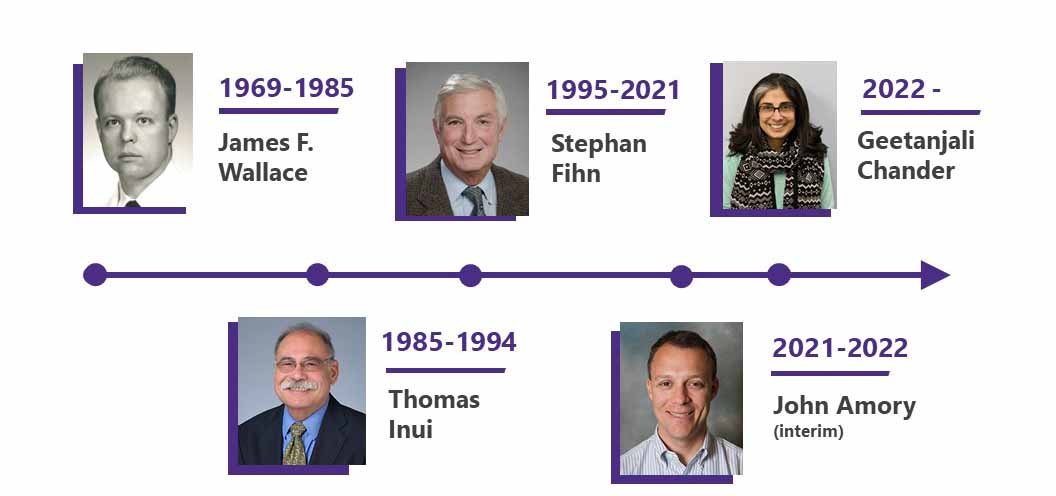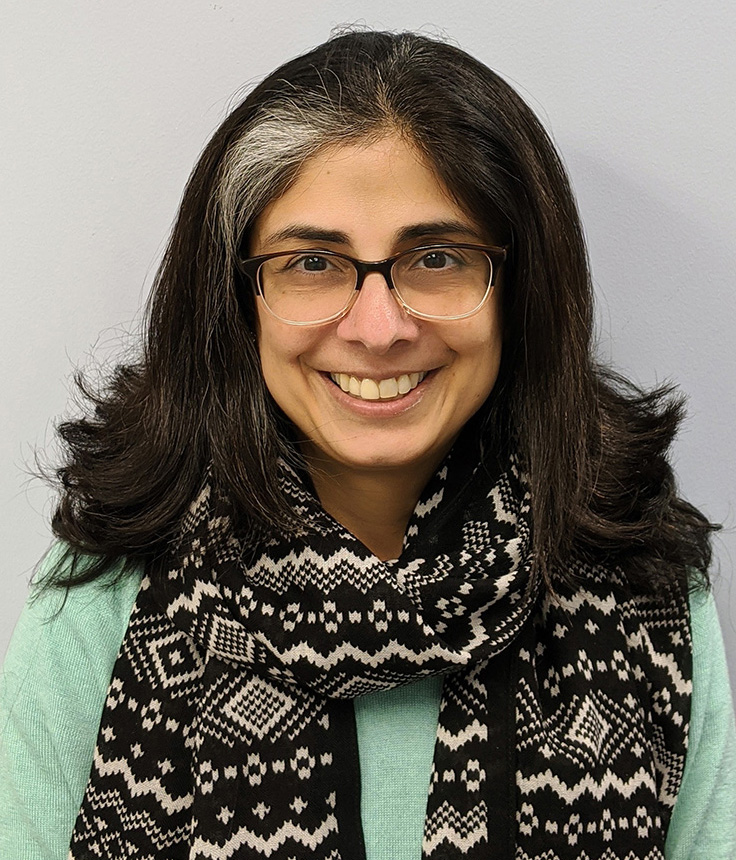
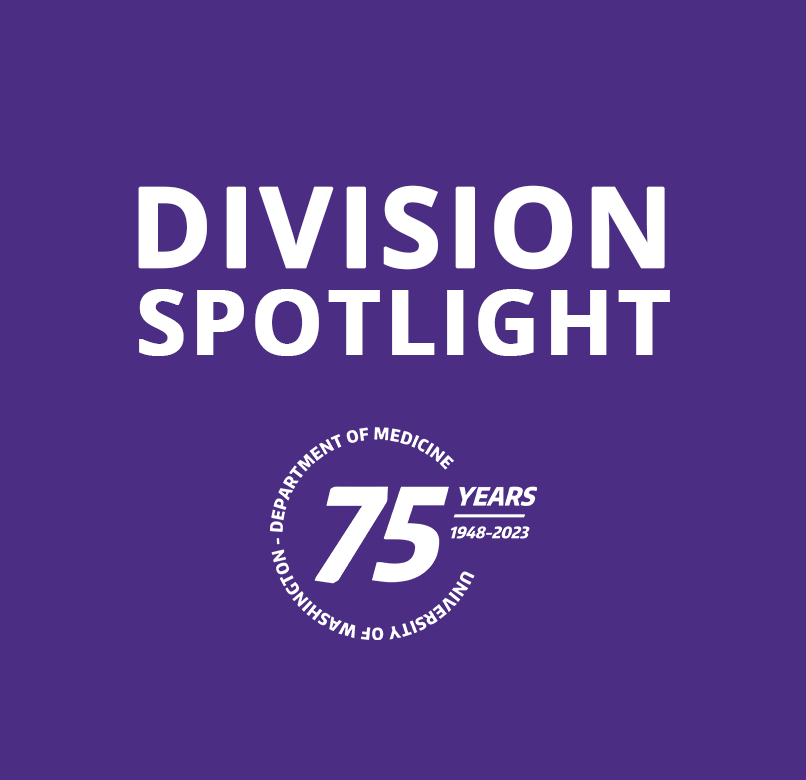

Division Spotlight: General Internal Medicine
Celebrating 75 Years
As part of our 75th Anniversary, we plan to spotlight each of our divisions over the course of the year, in the order that they were established. Learn more about our 75th Anniversary on our website
The Division of Ambulatory Medicine was founded in 1969 and led by Dr. James Findlay Wallace, who was also program director of the Internal Medicine Residency Program from 1977-2007.
It became the Division of General Internal Medicine (GIM) in 1985 with Dr. Thomas Inui as the first division head. It is now the largest General Internal Medicine division in the country with an extensive portfolio of education and research programs, and primary and hospital care in many settings including five medical centers, numerous ambulatory care clinics, patients’ homes, supportive housing, and substance use treatment programs.
Since the Division’s inception, GIM faculty have consistently held prominent teaching roles in the medical school and internal medicine residency training the next generation of internal medicine physicians.
Educational Training Programs
General Internal Medicine is home to premier training programs in research and academic general internal medicine and a partner fellowship with the VA Puget Sound Health Care System.
The overall goal of these programs is to prepare general internists to assume faculty and leadership positions in primary medical care, ambulatory care, hospital medicine and occupational and environmental health.
Starting in 2024, a new General Internal Medicine Clinical Investigator Fellowship will be started to train the next generation of clinician investigators in GIM.
Fellowships
Academic Hospitalist Fellowship
Established in 2018, the Academic Hospitalist Fellowship is designed for graduating internal medicine residents or early-career hospitalists seeking to accelerate their development as clinician-educators and academic leaders. Our curriculum has a well-rounded focus on quality improvement, medical education scholarship, bedside teaching, and career development.
Addiction Medicine Fellowship
The Addiction Medicine Fellowship is a one-year program, accredited by the Accreditation Council of Graduate Medical Education (ACGME). The program’s focus is to educate physicians broadly on the skills, knowledge, and attitudes essential to the integration of addiction treatment into primary care practice and addiction treatment continuity during transitions of care from the inpatient to outpatient setting.
General Internal Medicine Clinical Investigator Fellowship
The GIM Clinical Investigator Fellowship is a two-year fellowship designed to prepare graduating or recently graduated internal medicine residents for a successful career as a Physician-Scientist. Faculty provide fellows with mentored training in research methods, scholarly work, and leadership in academic quality improvement, research, or health policy focused on Addiction Medicine or Diabetes & Metabolism.
VA Health Services Research & Development Post-MD Health Services Research Fellowship
Seattle-Denver Center of Innovation, a VA Health Services Research and Development (HSR&D) Center of Excellence at VA Puget Sound Health Care System, offers a fellowship program in health services for physicians who have completed residency training. The two-year fellowship is designed to transform fellows into independent investigators prepared for future VA and/or University-based research careers. Emphasis is placed on one-on-one mentorship and peer interaction.
Residency
Occupational and Environmental Medicine
 Established in 1977, the Occupational and Environmental Medicine (OEM) training program at the University of Washington is one of the longest standing programs of its kind in the United States. Trainees learn directly from national leaders in OEM, leading to exciting careers for physicians from all backgrounds.
Established in 1977, the Occupational and Environmental Medicine (OEM) training program at the University of Washington is one of the longest standing programs of its kind in the United States. Trainees learn directly from national leaders in OEM, leading to exciting careers for physicians from all backgrounds.
Student Education
Medical Student Addiction Research (MedStAR) Program
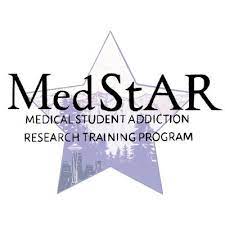 Newly established in 2020, the Medical Student Addiction Research (MedStAR) Program educates and trains medical students between their first and second year of medical school to conduct a mentored research project regarding substance use disorders.
Newly established in 2020, the Medical Student Addiction Research (MedStAR) Program educates and trains medical students between their first and second year of medical school to conduct a mentored research project regarding substance use disorders.
Faculty support students with high-touch longitudinal research mentorship that continues through their medical student years. The program provides UW medical students with opportunities to conduct and disseminate research findings by attending national conferences and publishing in peer-reviewed medical journals.
Patient Care
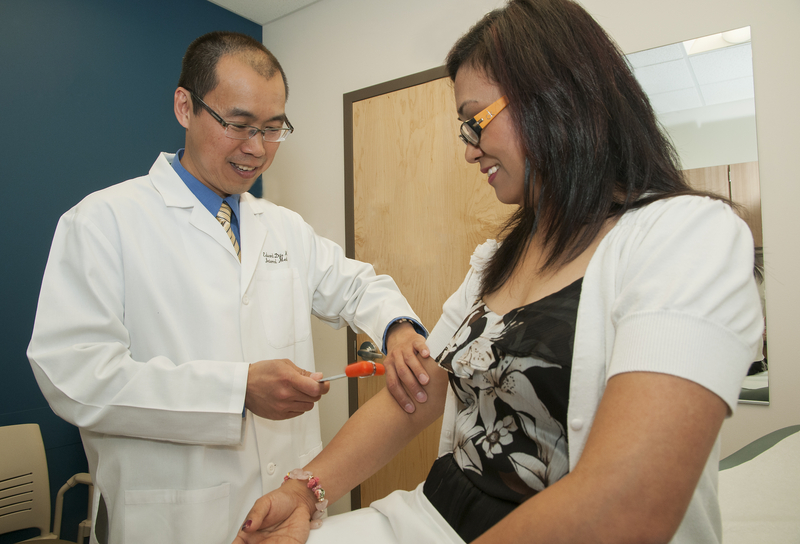 We provide medical care to outpatients and hospitalized patients in a wide variety of settings including three academic medical centers, several UW Medicine Primary Care clinics, e.g., Pioneer Square, patients’ homes, and supportive housing programs.
We provide medical care to outpatients and hospitalized patients in a wide variety of settings including three academic medical centers, several UW Medicine Primary Care clinics, e.g., Pioneer Square, patients’ homes, and supportive housing programs.
Our clinical programs focus on comprehensive primary care for adult patients, including preventive medicine services, assessment and treatment of acute medical challenges, monitoring and treatment of chronic diseases, women’s health, resuscitation, refugee care, addiction medicine, and more.
Hospital Medicine Program
We provide exceptional general internal medicine patient care, teaching, and research focused on the inpatient care environment. The program covers four clinical sites: Harborview Medical Center, UW Medical Center – Montlake, UW Medical Center – Northwest, and the VA Puget Sound Health Care System.
Clinical activities include primary general internal medicine care of hospitalized patients as well as a variety of medicine consultative services.
Outpatient Care
Our network of outpatient clinics provides our community with primary and specialty care throughout the greater Seattle area in our Primary Care Clinics and major medical centers at Harborview Medical Center, the University of Washington Medical Center – Montlake and Northwest, and the Puget Sound VA.
UW Primary Care
Housed at over 20 locations, our care team provides a full spectrum of primary care, including annual wellness and preventive healthcare services, management of chronic conditions, treatment of acute conditions, mental health services, and routine gynecologic exams.
International Medicine Clinic
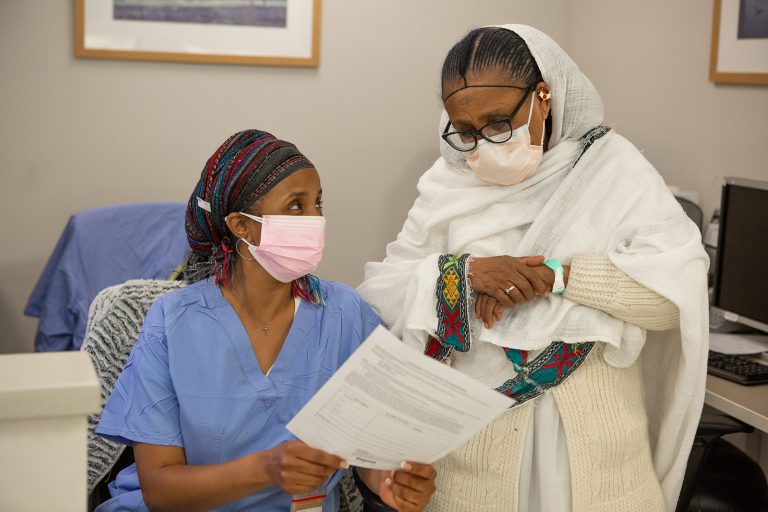 The International Medicine Clinic at Harborview offers high-quality primary and mental healthcare services to adult refugees and immigrants ages 16 and older. The full services of UW Medicine are available for other specialty care needs or hospitalization. The clinic also offers a Community House Calls Program to visit patients at home and make follow-up visits.
The International Medicine Clinic at Harborview offers high-quality primary and mental healthcare services to adult refugees and immigrants ages 16 and older. The full services of UW Medicine are available for other specialty care needs or hospitalization. The clinic also offers a Community House Calls Program to visit patients at home and make follow-up visits.
Patient-Centered Medical Home
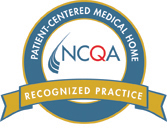 UW Medicine Primary Care is proud to be recognized by the National Committee on Quality Assurance (NCQA) as a patient-centered medical home: a patient-centered model for delivering healthcare that provides patients with comprehensive, high-quality, and cost-effective care. The medical home goal is to deliver primary care that is accessible, continuous, family-centered, coordinated, compassionate, and culturally appropriate.
UW Medicine Primary Care is proud to be recognized by the National Committee on Quality Assurance (NCQA) as a patient-centered medical home: a patient-centered model for delivering healthcare that provides patients with comprehensive, high-quality, and cost-effective care. The medical home goal is to deliver primary care that is accessible, continuous, family-centered, coordinated, compassionate, and culturally appropriate.
Research
Our faculty have achieved national prominence for research on a wide variety of important clinical problems such as heart disease, HIV, substance use disorders, Alzheimer’s disease, respiratory disease, cancer, diabetes, palliative care, veteran multimorbidity, global health, social drivers of health and more broadly health services research and population health.
Much of our research activities are housed in collaborative centers that focus interdisciplinary efforts toward a common goal: making health accessible for everyone, e.g., by positively impacting healthcare structures and policy.
Brain, Body & Appetite Research Collaborative Lab
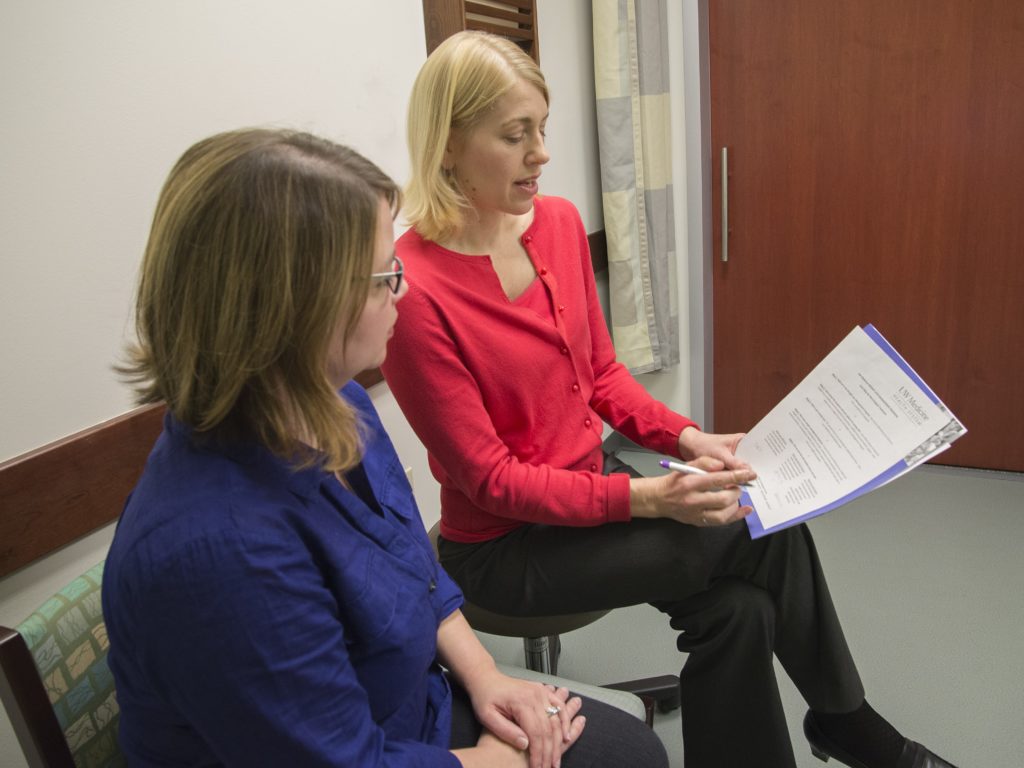 The Brain, Body & Appetite Research Collaborative (BBARC) Lab leverages multi-disciplinary translational research to investigate the relationship between weight regulation, the brain, and genetic, environmental, behavioral, social, and physiologic factors to improve the wellbeing of people living with obesity and related conditions. Their scholarship within the UW Medicine Diabetes Institute is internationally recognized.
The Brain, Body & Appetite Research Collaborative (BBARC) Lab leverages multi-disciplinary translational research to investigate the relationship between weight regulation, the brain, and genetic, environmental, behavioral, social, and physiologic factors to improve the wellbeing of people living with obesity and related conditions. Their scholarship within the UW Medicine Diabetes Institute is internationally recognized.
Cardiovascular Health Research Unit
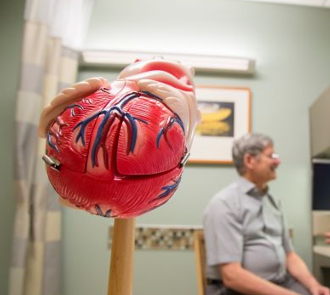 The Cardiovascular Health Research Unit (CHRU) is a joint program of several departments in the University of Washington School of Medicine and the School of Public Health. Researchers use innovative approaches not only to discover new biology through biomarkers and genomics, but also to evaluate the prevention and treatment of cardiovascular disorders.
The Cardiovascular Health Research Unit (CHRU) is a joint program of several departments in the University of Washington School of Medicine and the School of Public Health. Researchers use innovative approaches not only to discover new biology through biomarkers and genomics, but also to evaluate the prevention and treatment of cardiovascular disorders.
Center for Prehospital Emergency Care
Established in 2004, the Center for Prehospital Emergency Care (CPEC) at Harborview Medical Center brings together its longstanding activities that provide excellent prehospital emergency care, train others to do the same, and discover future methods of further improving care for patients with acute life-threatening illness in the out-of-hospital setting.
Center for Scholarship in Patient Care Quality & Safety
The Center for Scholarship in Patient Care Quality & Safety is dedicated to ensuring that all patients receive safe, high-quality care. Using rigorous science and scalable training and project support, our researchers accelerate the adoption of evidence-based practices that improve the safety, quality, and value of care for patients everywhere.
Medic One
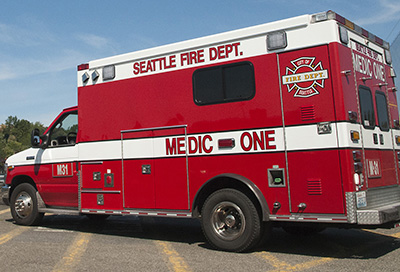 Founded in 1976, King County Medic One is a public service organization, a critical link in our regional Emergency Medical Service system, providing high-quality, advanced prehospital emergency medical care. Medic One has been a leader in pre-hospital research since its founding.
Founded in 1976, King County Medic One is a public service organization, a critical link in our regional Emergency Medical Service system, providing high-quality, advanced prehospital emergency medical care. Medic One has been a leader in pre-hospital research since its founding.
Occupational and Environmental Medicine Program
The Occupational and Environmental Medicine Program (OEM) focuses on policy-relevant research, including the relationship between exposure and disease, the cost versus benefit of new standards, and clinical interventions.
Primary Care Analytics Team (PCAT)
The Primary Care Analytics Team (PCAT) is an integrated research team in the Veterans Health Administration (VHA) Office of Primary Care. PCAT is a critical component of a Learning Health System providing analytic resources for the VHA’s planning, evaluating, and innovating of veteran care programming.
Substance Use Research and Education (SURE) Unit
The SURE Unit was established to nurture research and educational programs that are directed toward providing patient-centered, integrated care for persons with substance use and use disorders. SURE Unit faculty are currently conducting over a dozen projects aimed at improving the lives and health of persons with substance use and use disorders.
Value & Systems Science Lab
 The Value & Systems Science Lab (VSSL) seeks to advance understanding about how healthcare payment, delivery, and decisions affect health outcomes.
The Value & Systems Science Lab (VSSL) seeks to advance understanding about how healthcare payment, delivery, and decisions affect health outcomes.
Leadership
Our faculty have been leaders at UW Medicine (dean of the School of Medicine, medical center directors and associate medical directors) and nationally (four presidents and several officers and council members of the Society of General Internal Medicine, president of the American College of Physicians, and chair of the ACP Board of Governors.)
Division heads
